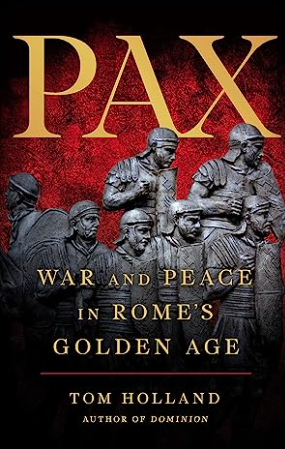In UnHerd, Freddie Sayers talks to historian and podcaster Tom Holland about his latest book, Pax:
To his army of ardent followers, Tom Holland has a unique ability to bring antiquity alive. An award-winning British historian, biographer and broadcaster, his thrilling accounts offer more than a mere snapshot of life in Ancient Greece and Rome. In Pax — the third in his encyclopaedic trilogy of best-sellers narrating the rise of the Roman Empire — Holland establishes how peace was finally achieved during the Golden Age, with a forensic recreation of key lives within the civilisation, from emperors to slaves.
This week, Holland came to the UnHerd club to talk about Roman sex lives, Christian morality, and the rise and fall of empires. Below is an edited transcript of the conversation.
Freddie Sayers: Let’s kick off with the very first year in your book.
Tom Holland: It opens in AD 68, which is the year that Nero committed suicide: a key moment in Roman history, and a very, very obvious crisis point. Nero is the last living descendant of Augustus, and Augustus is a god. To be descended from Augustus is to have his divine blood in your veins. And there is a feeling among the Roman people that this is what qualifies you to rule as a Caesar, to rule as an emperor. And so the question that then hangs over Rome in the wake of Nero’s death is: what do we do now? We no longer have a descendant of the divine Augustus treading this mortal earth of ours. How is Rome, how is its empire, going to cohere?
FS: It seemed to me, when I was reading Pax, that there was a recurring theme: a movement between what’s considered decadence, and then a reassertion of either a more manly, martial atmosphere, or a return to how things used to be — to the good old days. With each new emperor in this amazing narrative, it often feels like there’s that same kind of mood, which is: things have gotten a bit soft. We’re going to return to proper Rome.
TH: It’s absolutely a dynamic that runs throughout this period. And it reflects a moral anxiety on the part of the Romans that has been characteristic of them, really, from the time that they start conquering massively wealthy cities in the East — the cities in Asia Minor or Syria or, most of all, Egypt. There’s this anxiety that this wealth is feminising them, that it’s making them weak, it’s making them soft — even as it is felt that the spectacular array of seafood, the gold, the splendid marble with which Rome can be beautified, is what Romans should have, because they are the rulers of the world.
That incredible tension is heightened by class anxieties. There’s no snob like a senatorial snob. They want to distinguish themselves from the masses. But at the same time, there’s the anxiety that if they do this in too Greek a way, in too effeminate a way, then are they really Romans? And so the whole way through this period, the issue of how you can enjoy your wealth, if you are a wealthy Roman, without seeming “unRoman”, is an endearing tension. And of course, there is no figure in the empire who has to wrestle with that tension more significantly than Caesar himself.
FS: The 100-odd years that you’re covering in this volume is a period of great peace and prosperity and power, and yet at each juncture, it feels like there’s this anxiety. That’s what surprised me as a reader. There’s this sense of the precariousness of the empire — maybe it’s become softer, maybe it’s decadent, or maybe it needs to rediscover how it used to be.
TH: And, you see, this is the significance of AD 69, “the Year of the Four Emperors”, because the question is, are the cycles of civil war expressive of faults? Of a kind of dry rot in the fabric of the Empire that is terminal? Of the anger of the gods? And whether, therefore, the Romans need to find a way to appease the gods so that the whole Empire doesn’t collapse. This is an anxiety that lingers for several decades. It looks to us like this is the heyday of the Empire. They’re building the Colosseum, they’re building great temples everywhere. But they’re worrying: “Have the gods turned against us?”
And of course, there is a very famous incident, 10 years after the Year of the Four Emperors, which is the explosion of Vesuvius. And this is definitely seen as another warning from the gods, because it coincides with a terrible plague in Rome, and it coincides with the incineration (for the second time in a decade) of the most significant temple in Rome — the great temple to Jupiter on the Capitol, the most sacred of the seven hills of Rome.
Romans offer sacrifice to the gods or you pay dues to the gods rather in the way that we take out an insurance policy. And if the gods are busy burying famous towns on the Bay of Naples beneath pyroclastic flows, or sending plagues, or burning down temples, then this, to most, is evidence that the Roman people have not been paying their dues. So a lot of what is going on — certainly in the imperial centre — in this period, is an attempt to try and get the Roman Empire back on a stable moral footing.






